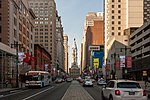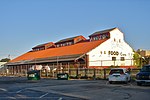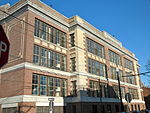Tindley Temple United Methodist Church
African-American history in PhiladelphiaArt Deco architecture in PennsylvaniaChurches completed in 1928Churches on the National Register of Historic Places in PennsylvaniaProperties of religious function on the National Register of Historic Places in Philadelphia ... and 2 more
Romanesque Revival church buildings in PennsylvaniaSouthwest Center City, Philadelphia

Tindley Temple United Methodist Church, also known as Tindley Temple Methodist Episcopal Church and Calvary United Methodist Church, is a historic Methodist Episcopal church located in the Southwest Center City neighborhood of Philadelphia, Pennsylvania. It was built between 1923 and 1928, and is a large masonry building influenced by the Beaux-Arts Romanesque and Art Deco styles.
Excerpt from the Wikipedia article Tindley Temple United Methodist Church (License: CC BY-SA 3.0, Authors, Images).Tindley Temple United Methodist Church
South Broad Street, Philadelphia South Philadelphia
Geographical coordinates (GPS) Address External links Nearby Places Show on map
Geographical coordinates (GPS)
| Latitude | Longitude |
|---|---|
| N 39.941388888889 ° | E -75.166388888889 ° |
Address
Tindley Temple United Methodist Church
South Broad Street 750
19146 Philadelphia, South Philadelphia
Pennsylvania, United States
Open on Google Maps










